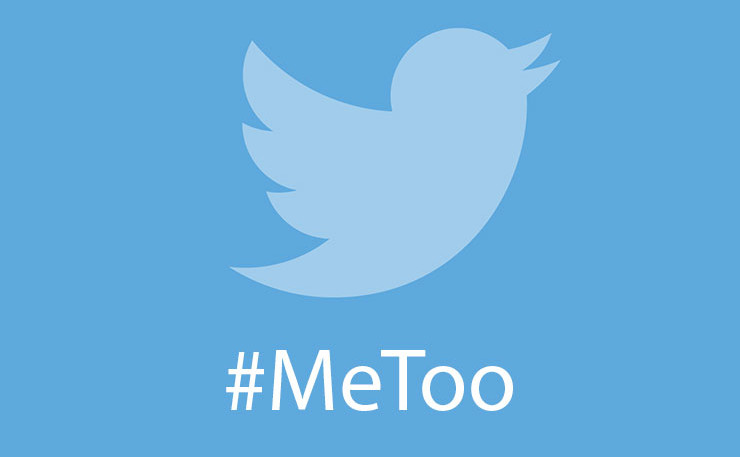Dr Liz Conor continues New Matilda’s series exploring the meaning and the motivation behind the explosion of #MeToo.
Recently, the White House Press secretary Sarah Huckabee Sanders said that the women who accused President Donald Trump of sexual assault and harassment are all lying.
As we ride out the Harvey Weinstein wave tail there could not be a starker reminder that women disclosing sexual violence continue to face disbelief and even smears.
Weinstein is in part vicarious Trump assassination. But Trump’s victims have been left ruefully watching Weinstein’s swift demise from the sidelines. For them, as for so many survivors, speaking out can be experienced as a secondary victimization.
The massive response by women to the #MeToo campaign was in part about providing a receptive audience for Weinstein’s victims as a counter to this secondary victimization. A critical mass of women survivors confirmed Weinstein’s victim’s allegations with their own experiences of assault.
It provoked reams of commentary from feminists – me too. And New Matilda readers can hazard a guess I’m responding here in part to Helen Razer at whom I took a bit of a swipe, which presented an occasion for her to good-naturedly clarify her position.

She also noted I hadn’t read her Crikey column (good thing I subscribe…) and emphatically directed us all to revisit Marx. So I did. I followed Helen’s links and dug out my Nelson and Grossberg (more anon). For I am a very punctilious lady and Helen got me thinking about feminist activism.
Along with the disclosures (which, when public, themselves have the capacity to trigger) #MeToo brought up memories of campaigning on sexual violence nearly three decades ago. The feminist commentary on #MeToo reminded me that when women call out male violence, pain can refer, and we turn on each other. Yet again the Left eats itself and we withdraw dazed into our own peculiar form of paralysis.
But I have a renewed sense of urgency about male violence because of my teenage Dorts, and the violent assault of one by a fridge-faced cop in April who sat on her head and pummeled her face with his knees. All of which I viewed frame-by-headspinning-frame on StreetSmart footage.
Fuck violent men. I am currently full of violent intent toward them, which debases me – I don’t believe in violence. But I sure want to punch a violent man in the face right now.
We’re clear, this is only one story, most of us have dozens. We are roused by Weinstein to peak FuckViolentMen. I frankly went off my nut the week Weinstein broke, as his semblances ate my brain from the inside out.
Makes it hard to turn with equanimity to the task at hand – how do we strike a balance between the vigilance and critique that fosters more effective activism, and this tendency for left cannibalism through a neat maneuver (not always undeserved) – ‘your campaigning is victimizing me more than the issue we’re aiming to fix’.
With #MeToo this was going to be especially fraught, right? Because women are finding voice for their own experiences of sexual assault – some who have never spoken out and have felt isolated and ashamed for years. They have assumed a supportive cultural space has been carved out for them by #MeToo.
So how do we critically interrogate this social media testimony, given it had no central organization, without implicitly panning the women who signed up? It is all Very Ouch. It harbors more triggers than a cache of Improvised Explosive Devices (Hello there ASIO! Good of you to join us.)
Yet #MeToo can’t be immune to analysis. It’s not just a chorus of hurting incantations. It is a media format in a consumer-oriented economy in which information and personal experience are commodities.
As Helen rightly pointed out, this kind of testimonial is mired in the corporate profiteering of Twitter, Facebook and the ‘media beast’. Increasing concentration of media is concentration of private property which shapes class relations. So ideas like #MeToo are materially interwoven in the political relations that we enter into through these very particular modes of production. Inextricably.
Another concern is that it amounts to a gratuitous display of trauma. Anna Spargo-Ryan in Meanjin decries the requirement on women to publically bleed by signing up to #MeToo: “We are women exposing our calcified flesh to men who probably don’t even remember their own complicity.”
We run the risk of singling out Weinstein as a monstrous anomaly. So Matilda Dixon-Smith in Junkee points out that the sheer numbers of women accusers in Hollywood exposes Weinstein’s abuse as an ‘open secret’. But by making him a focal point we could lose sight of “insidious predators like Weinstein [who]are embedded in every industry, in every power system in our world — harassing and abusing women unchecked and unencumbered by consequences of any kind.” Yep. But arguably the critical mass of signatories to #MeToo did exactly the opposite. This tweet nailed it. Weinstein quickly became every no doubt quaking man.
hey dudes if you’re surprised how many people posting to #metoo are women you know
think what that means about the men you know
— moth dad (@innesmck) October 16, 2017
There are a series of assumptions at work in these critiques of #MeToo:
- The women signatories were coerced.
- It was their expectation that other women would show solidarity by joining them, which was coercive.
- They confused their testimony with effective political action.
- They are celebrities or otherwise privileged women who unwittingly coerced more vulnerable women.
- They were required to graphically display their trauma at length thereby becoming exploited by the personal-essay economy.
- They were distracted from or unaware of how to make real demands for concrete change.
- It was akin to publicly self-harming.
Tricky.
The one that’s thrown me is this imputation of coercion. Clem Bastow in The Saturday Paper found herself wondering “if readers were keeping tabs on my reticence to say #MeToo.” She experienced the #MeToo signatories’ testimony as a ‘demand’ which she resented because “the demand to perform trauma is a key tenet of contemporary feminism”.
Is it? This is a largish claim to make about a very diverse political movement. But it’s not uncommon or entirely unwarranted – if you construe feminist writing as all that’s happening in the movement, that is. There are, and I think it opportune to remind us, scads of feminists who don’t publish beyond their SM posts and yet manage to get up to all manner of nefarious and depraved insurrection.
Clem also describes an “expectation to perform trauma as personal narrative” and the corollary is an “expectation that not doing so is somehow a betrayal”. But how do we know women signatories perceived other women not signing up as a betrayal, or even noticed? I’m aware of two women who didn’t sign, and that’s because they wrote columns about it.
To coerce is to ‘obtain (something) from someone by using force or threats’. Putting to one side that we’re levelling this at women who’ve experienced the very worst form of coercion, I fail to see any force or threat operating in #MeToo. And if it can be construed that women have been coerced, it is no less of a semantic stretch to infer that this accusation works to silence.
Maybe peer pressure – ‘influence from members of one’s peer group’ – is more accurate, and less clumsy in the circumstances. But dissing from the sidebar by correcting women’s word choice is hardly going to sort this out, or earn me comrades. So how do we account for a number of women saying they felt coerced by #MeToo?
While I was curled up with Karl in my Red Star pasties I chanced upon an old fav, Althusser and his theory of interpellation. He writes that ‘ideology “acts” or “functions” in such a way that it “recruits” subjects among the individuals or “transforms” the individuals into subjects by that very precise operation which I have called interpellation or hailing, and which can be imagined along the lines of the most commonplace everyday police (or other) hailing: ‘Hey, you there!’
If we situate social media conglomerates like Twitter (Forbes valued it at $22b last year) as entrenching the ideology of the ruling class then #MeToo and social media testimonial campaigns fulfill Althusser’s definition of ‘rituals of ideological recognition’. #MeToo becomes then a form of hailing, a recruiting to a cultural format that organises and structures experience as shared by members of a community – a dominant community. Hence the sense of coercion.
The shape of this community is in question by token of Twitter’s format. The fragmentation of community under neo-liberalism into atomized individuals gives twitter the appearance of a cacophony of solitary souls frantically searching for connection – ironically. If we’re assembled into a certain collectivity through twitter – some would argue it is an ensemble of individuals as distinct from political subjects (we’re coming to that).
But ideology is always dominant. So how can any of us stand outside it? How is resistance culturally legible, by what means can it be articulated? The question then for #MeToo is whether the consumption of information can have an active role in political struggle.
‘Clicktivists’ cop a lot of this sort of debunking. The inference is that they stop at the donate or petition button. But a bedrock of interventions, ranging from rallies, to stunts, banner drops, lock-ons and blockades (increasingly directed at financiers and investors) depends on funds raised from clicktivists. The unidirectional causality built in the spatial metaphor of base/superstructure needs to be rethought under the second industrial revolution – that of communication and technology. Also clicktivists seem to front up to a range of such actions and their planning.
Likewise we can’t assume that the women who signed up to #MeToo aren’t also involved in a range of feminist organising.
THE demands Helen feels are missing from #MeToo already came from his accusers and preceded it. They want him charged with assault. They want his influence and power quashed. They want other men to stop abusing their positions of economic power over women seeking employment. Through #MeToo women expressed support for those demands rather than necessarily making new ones.
It’s clear from the women still accusing Weinstein, allegations now dating back decades, that they felt isolated, ashamed and powerless. They have said it took a critical mass of women making allegations against Weinstein to give them voice. Much as it did Trump’s accusers.
And here is the rub. The disparity between these two sets of victims is stark and disturbing and we have to account of it. Not all of Weinstein’s victims were household names, but none of Trump’s were. When they spoke out, Republicans did not disendorse him and their assailant was still elected President of the United States ffs. These women’s entire country seemed to refrain, We Just Don’t Care. Any social media response in this instance needed to do something quite distinct from #MeToo. It needed to single out Trump as Perpetrator-in-Chief.

#MeToo will not bring about the changes we need for these women, and millions of women who’ve been assaulted without redress. It does not provide the kinds of infrastructure in women’s lives that secure their safety – the economic independence that releases women from what Marx called the first and crudest form of property – ‘latent slavery in the family’.
And right now it is surely impractical in the extreme to dismiss any call for Marxist analysis, what with neo-liberalism giving rise to an unfettered Oligarchy with historically unprecedented concentration of private property. It rather throws us back on the primacy of economics. It wasn’t just their masculine power Trump and Weinstein abused, it was their wealth power.
We can see then how the economy of feminine beauty worked in both scenarios. Trump and Weinstein’s sexual exploitation of aspiring young actresses, beauty contestants, ‘apprentices’ etc was built on the commodification of their sexual appeal that both men traded in and built their business empires upon – while they jerked off over their ‘stars’ in corridors.
Badiou writes, “Politics makes us, scattered individuals at first, into subjects that embark upon a collective project capable of guiding the common vision of united wills”. He writes of a ‘foundational event’ in people’ lives, a moment of rupture, through which the individual becomes a political subject and joins in the collective will.
For many women sexual assault has been the event that made them feminists, despite it being mired in shame and silence. #MeToo does not provide us with an organisational framework for action. It did however provide a forum for what Badiou calls the ‘transindividual imperative’, one in which we saw the kind of numbers you just can’t pull together otherwise, a critical mass that is yet to take shape as a community for action.
Once hashtagged into this fleeting collective, sticking around and sticking together may be akin to herding alphabet soup in the surf. There are only four intersections in a hashtag: this is not going to cover our all differences. The question is whether social media can work as an arena for political engagement or is it only good for an expression of individual wills rather than collective will.
And while we’re mulling all this over, we need to keep our eye on our common enemy and remember Trump’s accusers are now famous, whether they like it or not, for ‘lying’.
Donate To New Matilda
New Matilda is a small, independent media outlet. We survive through reader contributions, and never losing a lawsuit. If you got something from this article, giving something back helps us to continue speaking truth to power. Every little bit counts.





